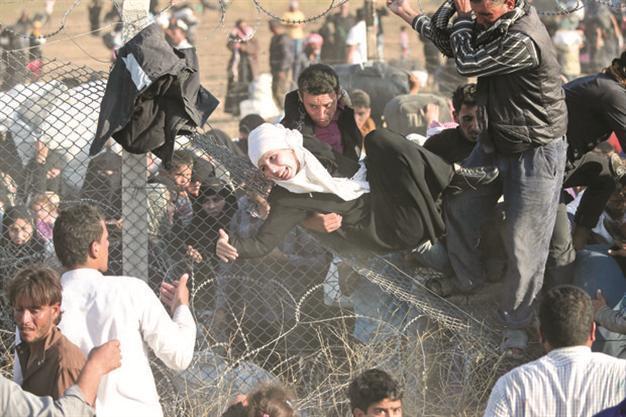Istanbul exceeds Europe in Syrian refugees, aid agency head says
NEW YORK – The Associated Press

AP photo
There are currently more Syrian refugees in Istanbul than in all the rest of Europe and nearly 60 percent of refugees are living in cities today, the head of the International Rescue Committee (IRC) said on Oct. 26.IRC head David Miliband told The Associated Press in an interview that “the iconic image” of a refugee being someone in a camp has changed.
“First, so many people are fleeing conflict and chaos that there’s no room for them in camps. Equally important is that most people don’t want to be in refugee camps and when they’re displaced for a long time [they] want to earn a living - even if that means working in the black market,” he said.
Miliband gave the example of Istanbul, without citing any figures. The IRC said there are currently more Syrian refugees in Istanbul than the 366,000 Syrian refugees it estimated are in the rest of Europe.
Currently, there are 20 million refugees in the world - including 2 million in Turkey - and 40 million people uprooted and displaced in their own countries, which Miliband called “a grisly world record.”
The former British foreign minister said that as the president of a leading humanitarian organization helping refugees it’s important to ask whether these numbers are “a trend or a blip.”
“Everything says to me it’s a trend, not least because the global situation is of more people on the move,” Miliband said, pointing to the additional 200 million people seeking “an economic better life as migrants or immigrants.”
Looking at the roots of what he calls the current “refugee and migration crisis,” Miliband first cited “the tumultuous convulsions inside significant parts of the Islamic world.”
He also pointed to the 30 to 40 nations that can’t meet the basic needs of their citizens and contain ethnic, political or religious differences among their people and “an international political system weaker and more divided than at any time since the end of the Cold War - and arguably weaker than during the Cold War itself.”
Francois Crepeau, the U.N. special investigator on migrant rights, said Oct. 23 that two million refugees from the Middle East should be resettled in Europe over five years, which means 400,000 per year, divided by either the 28 European countries or the 32 countries in the global north.
Miliband said there’s no question a continent with 500 million people can cope with 400,000 refugees a year, “but it has to be done in a competent way.”
The IRC recently interviewed more than 800 families in and around the Aegean province of İzmir and found 80 percent of them were from the war-torn countries of Syria and Iraq, while others were fleeing conflict in Afghanistan and Pakistan. It said most were refugees, not economic migrants, hoping to go to Europe.
Miliband said a very large majority made it absolutely clear they were not going back to their home countries and had sold their homes and spent all their savings to pay smugglers to get to Turkey. The IRC said nearly 40 percent of those interviewed said they could not afford the approximately $3,500 needed to pay smugglers to reach Europe.
Miliband said the smuggler trade is being fueled by the lack of legal routes to resettlement.
“I think there’s a very strong case for a processing center in Turkey that would actually register people and process them and explain where they are in the queue and what chances they’ve got,” he said. “That’s the only way those people are not going to go into the hands of the smugglers. It’s clear the fences are not going to stop smugglers.”
















